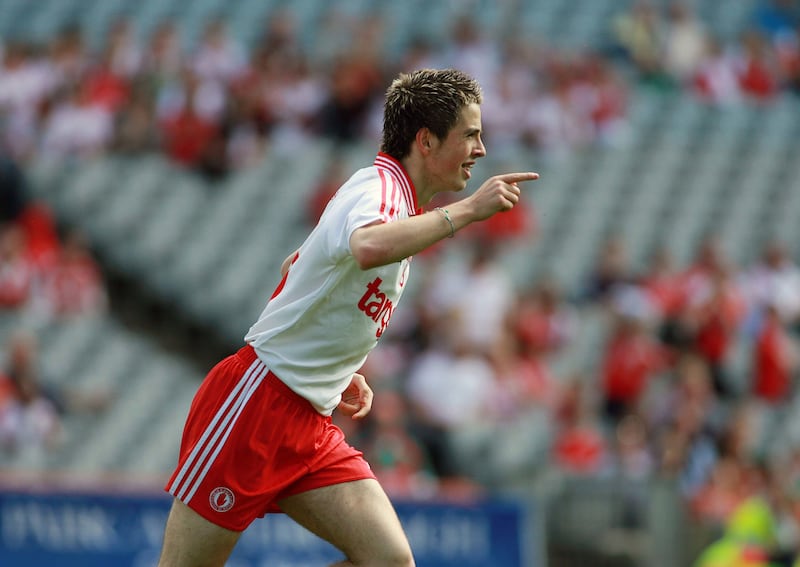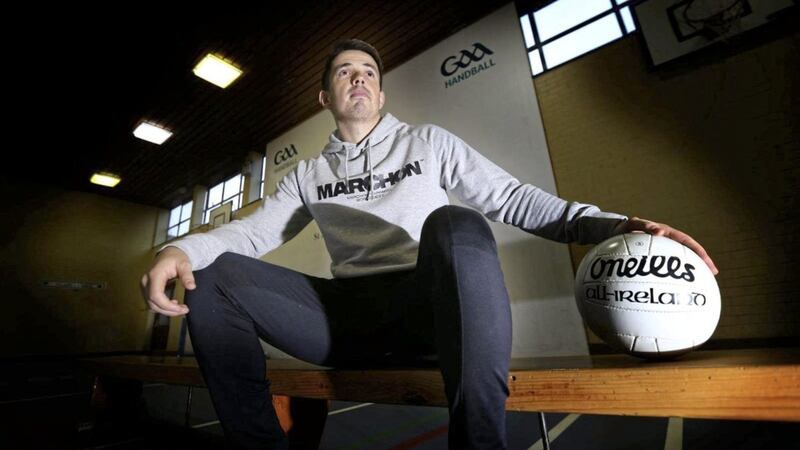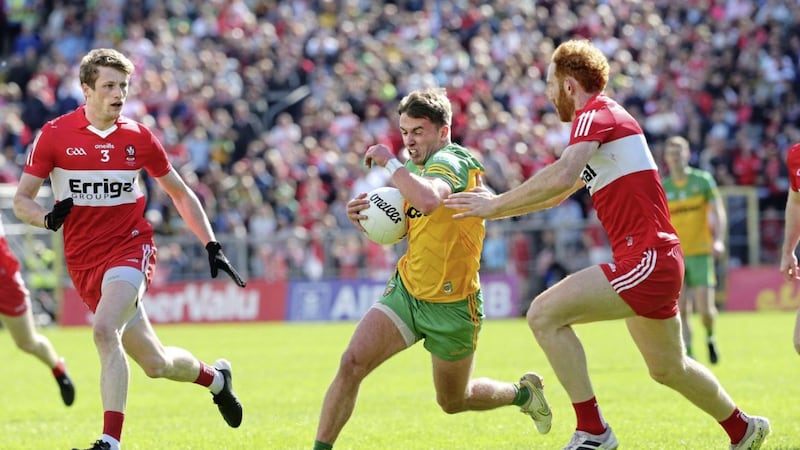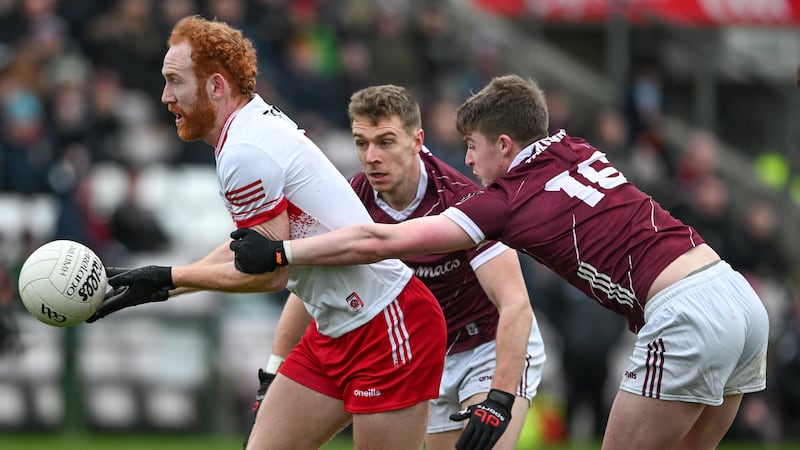IT was a decidedly balmy evening in Orlando on New Year’s Eve. The Tyrone players, management and their partners gathered around the hotel pool for dinner.
Ronan O’Neill hadn’t the slightest inkling Mattie Donnelly would rise to his feet and ask for a bit of hush. It seemed fitting that Donnelly, on behalf of the squad, would officially pay tribute to O’Neill and Hugh Pat McGeary, both of whom were retiring from inter-county football.
“I made my decision before I went on holiday,” O’Neill says.
Part One: 'I just couldn't go through another year with Tyrone' - Ronan O'Neill
“In fairness, Feargal and Brian gave me more time to think about it. The boys were back two or three weeks and I just felt I wasn’t in the right mind-set to go back.
“They checked in with me every so often… Feargal had said reporters were asking about me and a few others. I’m going to be 30 this year and I would doubt I would be taking a year out as a 30-year-old, so I said put it down as retirement.”
Before they left Dublin Airport Richie Donnelly, one of O’Neill’s All-Ireland minor winning team-mates and close friends, smiled and said to him: “I’m going to twist your arm to come back.”
Donnelly’s attempts were in vain.
Sitting in a coffee shop in Dungannon last Wednesday, O’Neill says: “I saw the holiday as a final opportunity to say goodbye to the boys and to enjoy it.
“When Mattie got up to speak it was emotional. I wanted to say a lot of things but I couldn’t say too much. It was 10 years of my life, a third of my life I’ve been there...
Hugh Pat also got up and said a few words.
O’Neill adds: “People might read this and say: ‘Sure it’s only another retirement.’ But I’m not going to play with these boys again… but deep down I’m content with my decision...”
***********
SATURDAY, August 6 2016, Tyrone versus Mayo in Croke Park. It’s anybody’s game.
Ronan O’Neill is standing on the edge of Mayo’s square with Brendan Harrison for company, staring into the abyss.
At one point O’Neill reckons there were 70 or 80 metres between him and his nearest Tyrone team-mate.
In the opening seconds of the All-Ireland quarter-final, he spins away from Harrison in front of Hill 16 and puts a low ball across the face of Mayo’s goal but the danger is cleared.
In the opening half he gets two sights of Mayo’s goalposts but misses. He is lively nonetheless and gets out in front of Harrison a couple of times but has to turn back.
Just before the break Harrison steals the ball off him – the kind of eye-catching dispossession that sends the Mayo supporters into raptures in the nearby Cusack stand.
Advantage Harrison.
Tyrone continue to run the ball from deep. Surrounded by green jerseys, O’Neill is disconnected from the play.
In the 42nd minute, he’s replaced by Darren McCurry in a like for like change.
Tyrone had 31 shots, many of them wild hacks from bad positions, and converted 12. They lose by a point.
The main criticism of Tyrone during those years was not positioning more forwards close enough to the opponents’ goal and their steadfast refusal to kick the ball in.
Against Mayo, O’Neill was occasionally joined by Connor McAliskey and Peter Harte drifted inside a couple of times, but the support was scant.
“When you’re in that tactical bubble you think you can win,” O’Neill says.
“Mayo were on the ropes and only beat us by a point. Looking back now and you’re playing one up front, it’s probably ridiculous to be fair. The way Tyrone played last season you need three, maybe four forwards up there.”
Mickey Harte, rightly or wrongly, seemed to lose a bit of faith in the flamboyant Omagh man after their All-Ireland quarter-final exit to Mayo in 2016.
Of course, these were austere times. Gaelic football in the last decade was dour and defensive, much of it unwatchable.
Amid the mass retreats that were taking place, corner-forwards were becoming an endangered species.
These brooding fields were no place for artisans like Ronan O’Neill.
Players like him used to be lauded for their game-winning skills set and panache but they were now being viewed through a more sceptical prism.
On many days in O'Neill's era, forward players were completely swallowed up by uber-defensive, Darwinian systems.
Jim McGuinness’s Donegal invented a darker form of Gaelic football; Tyrone reacted – in fact, the entire country reacted – with the Red Hands finally breaking the Tír Chonaill men’s provincial domination in 2016.
“I’ve massive respect for Mickey Harte,” says O’Neill, who won three Anglo-Celt Cups.
“He brought me in at 19 years of age, gave me the opportunity to play for Tyrone. Any time I went to Mickey to ask him what I needed to do to get into the team, he would explain to me: ‘You are close’ or ‘You need to do x, y and z…’
“He was fine with me. Mickey had a style and I simply didn’t fit into it. There were maybe two forward berths and six of us trying to get into them. You had ‘Sparky’ [Mark Bradley], McCurry, ‘Skeet’ [Connor McAliskey], big Sean [Cavanagh] was there, Cathal [McShane] was coming on the scene, Petey Harte was knocking about the forward line, Mattie [Donnelly] too, so there were a number of options there.
“I think we could've been more flexible.
“I never would say to a manager: ‘Why am I not playing?’ I’d ask: ‘What do I need to do to get playing?’
“I went to Brian Dooher last season and said: ‘I’d like to play 11.’ And Brian said: ‘You need to work hard and tackle hard in the middle third.’ And I said: ‘That’s okay. I’ll do that.’
Ballymaguigan man Paddy Crozier, who enjoyed two successful stints with St Enda’s Omagh in the last decade, baulks at the notion that O’Neill wasn’t equipped to play in the modern game.
“The game didn’t become too quick for him – it became too defensive,” Crozier says.
“Peter Canavan wouldn’t have starred in that kind of football. That’s what happened to corner-forwards like Ronan O’Neill.”
Raymond Munroe, Tyrone’s All-Ireland winning manager in 2010, makes an exaggerated point – but a valid one nonetheless.
“Linford Christie is some sprinter – but he wouldn’t make a Gaelic footballer. It turns out Linford Christie could've been a good Gaelic footballer,” Munroe says.
Tyrone’s minor class of 2010 were a slow-burner of a team – good without being exceptional.
They didn’t have the marquee names like ’08 but once they knocked Antrim out of Ulster at Casement Park, Munroe’s youngsters took flight.
“We had big Harry Og [Conlon] and Conan Grugan playing great football in the middle of the pitch,” O’Neill says.
“Tommy Canavan at centre half-forward who was a dream for an inside player because all he wanted to do was kick the ball to you.
“I was playing inside with John McCullagh, we played schools football together. We’d Conor Clarke at full-back, Hugh Pat [McGeary] in the corner, Shea McGarrity was the captain, Niall Sludden, Stefan Tierney, Richie Donnelly… it all just clicked.”

They edged Down in the semi-finals and swept to a comfortable victory over defending Ulster and All-Ireland champions Armagh in the final.
Mayo and Kerry were next to fall on the All-Ireland stage as the young Red Hands set up a final meeting with All-Ireland Cork.
Munroe recalls: “With Cork playing in the senior final and their fans coming in and maybe making a difference, we said our score-line towards the end would have to be far enough ahead of Cork to stop the spectators bringing them back into the game.
“And they very nearly did because we were under severe pressure. Ronan would have been a marked individual because he was very talented.
“Coming through the ranks, he was the nearest thing to Peter Canavan. He was just doing things that were extra-special.
“We talked about the final and we knew Cork were going to double up on him so we asked him to work harder than he ever did before because we wanted Cork to believe that he was our outlet. He never stopped running to the corner in that game. Our outlet was going to be John McCullagh. They were our two-man full-forward line…
“Ronan played it to a tee that day because the Cork sweeper kept going to him. Ronan was prepared to sacrifice his own game for the team - and that in itself tells a lot about someone’s character.”
***********
IT was his father who put it into his head.
‘Why don’t you go to a session and play with your left foot only? You know you can play with your right foot, so play with your left…’
He remembers the first few sessions playing solely with his weaker left foot.
“I was absolute muck.”
But he persisted. He reckons it took him two full years to perfect his left foot.
It just wasn’t those left foot-only training sessions that moulded him into one of the brightest prospects in Tyrone - it was these endless summer days up in Downings playing football with his brothers, “kicking lumps out of each other” and them having to be dragged into the caravan after dark.
At the St Paul’s and Kickham's Creggan minor and U21 tournaments, O’Neill had bigger audiences to display his freakish talent.
In those years, the Omagh teenager was virtually unstoppable.
In 2012, Mickey Harte called him into the senior squad.
Wearing a rueful smile, O’Neill says: “I felt I was on a massive rising curve…but injuries are part of football.”
A Monday night training session in Cookstown and the Tyrone U21 squad are preparing for their Championship meeting with Donegal.
They were in the early throes of a 10-minute game. Shay McGuigan kicks a high ball into him. He gets the slightest nudge in the back.
“I went high up in the air, landed on one leg and heard a crack. I remember Richie Donnelly wincing. I was down roaring and crying. I knew something was wrong…”
It depends on who you talk to in Tyrone but some say O’Neill never got back to where he was after suffering the cruciate injury. The player himself would beg to differ but shrugs his shoulders.
“I can’t change people’s opinions of me. All I can do is be myself. If people have that opinion of me, that’s okay. I tried my best.”
In 2014, he inspired Omagh to their first senior championship in 26 years – producing a moment of magic in the final minutes to grab a goal to sink Carrickmore by a point.
He was shooting the lights out for Tyrone throughout 2016, he won another club championship the following year and hit two brilliant goals to sink Down in the 2017 Ulster final.
But there were other dog day afternoons playing for Tyrone.
He suffered the ignominy of being withdrawn in the 62nd minute after being introduced as a first-half substitute in Tyrone’s 2018 Ulster Championship defeat to Monaghan at Healy Park.
He took his gloves off and threw them to the ground in disgust.
In their successful All-Ireland Qualifier run that same summer, he couldn’t believe how many substitutions were made before him especially when Tyrone were in dire need of an attacking spark to reel Meath in down in Navan.
“We’d no ‘Sparky’, Lee Brennan was gone, we’d no forwards. We needed scores and I was on the bench.”
O’Neill eventually entered the fray and set up the winning goal for Harry Loughran in extra-time.
By the time of his introduction in the 2018 All-Ireland final, Dublin were already home and hosed and cruising to four-in-a-row.
************
HE stepped away from the Tyrone panel in 2019 but had every intention of going back to give it one last crack.
Then the global pandemic struck with almighty force. You blinked and Tyrone’s 2020 season was over and Mickey Harte was gone a few months later.
O’Neill had targeted 2021 as his last hurrah. He would leave no stone unturned in his insatiable pursuit of a regular place on the Tyrone team.
“I trained with Conor Meyler during lockdown because Conor does everything to the letter of the law.”
For five months the pair trained like dogs in the dark and in all sorts of weather around Healy Park.
“I was going to be doing the training anyway,” Meyler says.
“I need to do that to get the best out of myself. I have to be in better shape than everybody else, whereas Ronan had the footballing talent. He would see a pass or a goal-scoring opportunity that others wouldn’t comprehend. That was always his greatest asset, to spot those things.
“I’ll never be at that level and most boys won’t. That was his special trait – but he also knew he had to get fitter and faster and credit to him, he put the head down and did the work.
“It’s funny because I would always have looked up to Ronan at the club and when he wanted to get in shape he came to me.”
Meyler adds: “The thing about Ronan was he never shied away from responsibility. He always stepped up and wanted to make a difference in big games. If there was a big moment coming up and you needed a score it was a case of get the ball to Ronan because he could make something happen.”
Who will forget the day Cathal McCarron sent in a ‘Hail Mary’ on top of Carrickmore’s Mickey Slane and O’Neill in the closing stages of the 2014 county final and O’Neill winning it before rounding Big ‘Oz’ McCallan and hammering the ball into the net to win the cup for Omagh for the first time in 26 years.
There were those endless days in Downings playing until dusk, his mother urging him: ‘Don’t pass the ball Ronan – put it over the bar’.
Growing up, he was St Enda’s dream giver. Pure joy on a field. Absolutely everything about him was audacious.
‘Just go out and play, Ronan.’
And he'd eye-ball the hard yards put in front of him.
Raymond Munroe will always remember his selfless running in the 2010 All-Ireland minor final that tripped up Cork.
For the Red Hands, a thousand times over.
“Ronan O’Neill was a team player,” Paddy Crozier says. “Was there any particular skill he was good at? There was no skill he wasn’t good at.”
The pride he felt at being called up to the Tyrone seniors in 2012. And the agony of the cruciate.
Battling his way back. In the team - and out again. Snakes and ladders.
For him, the bench was death by a thousand cuts.
That dummy hop in Celtic Park. Lobbing Down’s Mickey Cunningham in sunny Clones and feeling the weight of the Anglo-Celt above his head.
“The best thing about playing football and winning is the 30 minutes after the final whistle,” he says.
“You’d love to bottle that feeling. If you offered me a million pound, I wouldn’t sell it.”
Throwing the gloves off in disgust in 2018, feeling like the fall guy. Leaving Tyrone and coming back.
Running in the snow with Meyler and turning up to training in his Tuxedo. Pushing. Always pushing.
The feeling of devastation of missing out on the All-Ireland final squad. And still being able to tip his hat to “Feargal and Brian”.
Holding back the tears in Orlando when Mattie Donnelly got up to speak.
Ten years gone in a blink of an eye.
No more bus trips, no more going to the well with the Tyrone boys, no more post-match DJ-ing and no more dance-offs with McCurry.
This is what it was like living in the Tyrone bubble.
Now it's all over, the Tyrone camp is a little quieter without him.
But Tyrone people will never forget Ronan O'Neill and the moments of sheer joy he was only too happy to share.
He was their born entertainer...








